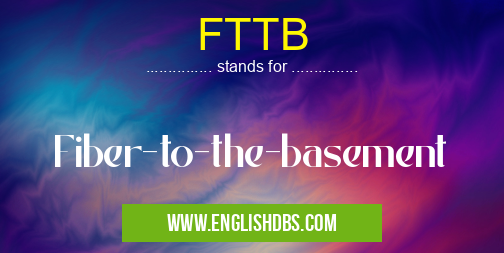What does FTTB mean in TELECOM
FTTB stands for Fiber-to-the-Basement. It refers to a type of fiber optic broadband internet technology where fiber optic cables are installed from the network provider's central office to a basement or equipment room in a multi-dwelling unit (MDU) building, such as an apartment complex or condominium.

FTTB meaning in Telecom in Computing
FTTB mostly used in an acronym Telecom in Category Computing that means Fiber-to-the-basement
Shorthand: FTTB,
Full Form: Fiber-to-the-basement
For more information of "Fiber-to-the-basement", see the section below.
How FTTB Works
FTTB utilizes fiber optic cables to establish a high-bandwidth connection from the service provider to the building's basement. Within the basement, the fiber optic cables are connected to a distribution point, where they are converted to copper or coaxial cables. These copper or coaxial cables then run through the building to individual apartments or units, providing high-speed internet connectivity to residents.
Advantages of FTTB
- High Speeds: FTTB offers significantly faster speeds than traditional DSL or cable internet connections.
- Reliability: Fiber optic cables are less susceptible to interference and signal degradation, resulting in a more reliable internet connection.
- Scalability: FTTB can be easily upgraded to support higher bandwidth demands as technology advances.
- Future-Proof: Fiber optic infrastructure has a long lifespan, making FTTB a future-proof technology solution.
Disadvantages of FTTB
- Cost: Installing FTTB can be more expensive than other broadband technologies due to the cost of fiber optic cables and installation.
- Limited Availability: FTTB is not as widely available as other broadband technologies, particularly in rural areas.
- In-Building Wiring: The conversion to copper or coaxial cables within the building can introduce potential bottlenecks and reduce the overall performance.
Essential Questions and Answers on Fiber-to-the-basement in "COMPUTING»TELECOM"
What is FTTB (Fiber-to-the-Basement)?
FTTB is a type of fiber optic network architecture where optical fiber cables are run to a building's basement, and then copper cables are used to connect individual units within the building. FTTB provides faster and more reliable internet connectivity than traditional copper-based technologies.
What are the benefits of FTTB over traditional copper-based networks?
FTTB offers several advantages over traditional copper-based networks, including:
- Higher bandwidth: Fiber optic cables can transmit data at significantly higher speeds than copper cables, enabling faster internet connections and support for bandwidth-intensive applications.
- Lower latency: Fiber optic cables have lower latency than copper cables, which means there is less delay in data transmission, resulting in a more responsive and seamless internet experience.
- Improved reliability: Fiber optic cables are less susceptible to interference and damage than copper cables, making FTTB connections more reliable and less prone to outages.
How does FTTB work?
FTTB networks are typically deployed as follows:
- Optical fiber cables are run from a central office or network provider to the building's basement.
- A network termination point (NTP) is installed in the basement, which houses the equipment needed to connect the optical fiber cables to the building's internal network.
- Copper cables are then run from the NTP to individual units within the building, connecting them to the network.
Is FTTB available in my area?
The availability of FTTB services varies depending on location. Contact your local internet service provider (ISP) to inquire about FTTB availability in your area.
What is the cost of FTTB installation?
The cost of FTTB installation can vary depending on the size and complexity of the building, as well as the specific ISP offering the service. Contact your ISP for a detailed quote.
Final Words: FTTB is a promising broadband technology that offers high speeds, reliability, and scalability for MDUs. While it has some limitations in terms of cost and availability, FTTB remains a valuable option for providing high-quality internet connectivity in multi-tenant environments.
